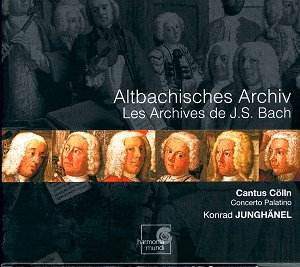The
blurb on the back of this disc sums up what it is quite well:
"If Bach had not lovingly preserved the works of his forefathers,
we would know almost nothing about them. His collection, known
since the eighteenth century as the 'Altbachisches Archiv', was
published for the first time in 1935. The original manuscripts,
lost during the Second World War, were recently located in the
Archives in Kiev. Here now is a recording of the complete collection."
This
is indeed a unique discovery, and one that sheds a great deal
of light on Johann Sebastian Bach's forefathers and the musical
heritage he followed. Bach was naturally the natural follower
of this vast family of musicians, and, while some of his ancestors'
music is know and has been recorded, this is the first recording
in extenso of Bach's own personal heritage, the actual
works that he knew and, perhaps, studied and even performed.
This
is a cornucopia of works, diverse and varied, both in type and
in style. With arias, motets, laments and cantatas. The set shows
the influences that affected Bach, and, in a way, the genetic
material he inherited. It's a mixed bag, with works ranging from
excellent to barely interesting; not all these pieces merit the
attention they have been given.
This
disc is lovingly recorded and performed. Cantus Cölln, a
group with experience in recording and performing vocal works,
especially madrigals, as well as other recordings of Bach and
similar baroque music, has a perfect sound. The voices both stand
out individually and meld together as a unit. The recording is
exceptional, and the sound of each work is near-perfect.
Some
of the works are beautiful: one such work is the cantata Meine
Freundin, Du ist schön by Johann Christoph Bach, which
closes out the first disc. This is the longest work here at over
23 minutes, and it includes some wonderful sections that are closer
to a motet; in fact, the accompaniment of the soloists is often
minimal, though certain sections do make greater use of the orchestra.
Sadly
many of the tracks are just uninteresting, and even, at times,
unmelodic. The lament Wie bist du denn, o Gott in Zorn,
by Johann Christoph Bach, one of the longest works in this disc,
is one such example: lugubrious, depressing, and monotonous, this
work is truly not one I would like to listen to at all often.
Sure, it is a lament, and is therefore supposed to be depressing,
but the melodic material of the vocalist is so bad that it is
painful to listen to. (Note that, in spite of this, the performance
is excellent, with the occasional appearance of an attractive
violin obbligato.)
I
don't want to pick on Johann Christoph Bach, but another of his
works, the motet Unseres Herzens Freude, fits partly into
this category as well. While it opens with an interesting use
of percussion and trumpets, coupled with voices, to sing out in
a jubilatory fashion, it then moves into a section where the same
phrase is repeated several times, too many times. If I were listening
to this on an LP I would have gone to check my turntable to see
if it was skipping.
I
feel that I'm being unfair; after all, many others who have listened
to this disc have enjoyed the music much more than I. Do note
that, in spite of my reservations concerning the actual music,
the performances and recording are excellent.
This
compendium of works by Johann Sebastian Bach's ancestors is a
valuable document contributing to our understanding of the great
lineage of the Bach family. While some of the music is uninteresting,
the performances are as good as they could be.
Kirk
McElhearn


